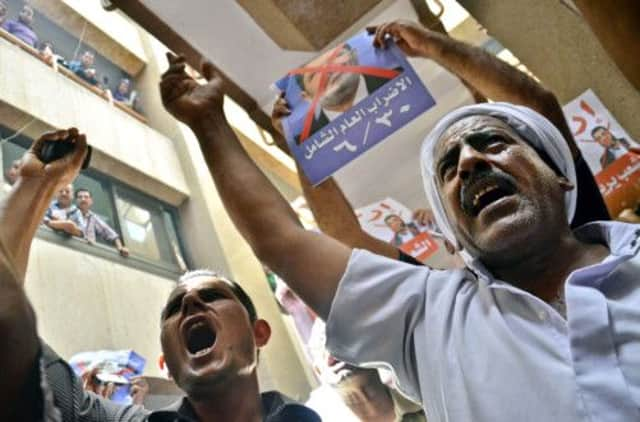Court points finger at Brotherhood over jail breakout


The court statement read by judge Khaled Mahgoub named two members of Mr Morsi’s Muslim Brotherhood – Ibrahim Haggag and Sayed Ayad – to be among the alleged conspirators in the attack on Wadi el-Natroun prison in January 2011.
It is the first statement by a court that holds members of the three Islamist groups – the Egyptian Muslim Brotherhood, the Palestinian Hamas, and Lebanon’s Hezbollah – responsible for a series of jailbreaks during the chaos of Egypt’s 2011 uprising. Two other prisons in which Hamas and Hezbollah members were held were also attacked.
Advertisement
Hide AdAdvertisement
Hide AdMr Morsi and other Brotherhood leaders have maintained that they were freed by local residents. Hamas, the Palestinian chapter of the Brotherhood, has denied involvement in the attacks on prisons.
The allegation is likely to further fuel opposition to Mr Morsi’s rule just a week before his opponents are scheduled to stage massive protests to force him out of office. The planned 30 June demonstrations mark his first anniversary in office as Egypt’s first freely elected leader.
The past year has seen growing polarisation as Egypt struggles with a host of problems that many accuse Mr Morsi of failing to effectively tackle. They include surging crime, rising prices, power cuts, fuel shortages and unemployment.
Mr Morsi has not spoken publicly about his escape from Wadi el-Natroun since he gave an account of what happened in a frantic phone call he made to journalists moments after being freed.
“From the noises we heard … It seemed to us there were [prisoners] attempting to get out of their cells and break out into the prison yard and the prison authorities were trying to regain control and fired tear gas,” Mr Morsi said in the call.
By the time they got out, the prison was empty, and there was no sign of a major battle, he said.
The prison breaks took place during the 18-day popular uprising that toppled the 29-year regime of Hosni Mubarak. The breaks led to a flood of some 23,000 criminals on to the streets, fuelling a crime wave that continues to this day. Among those who escaped were around 40 members of Hamas and Hezbollah as well as the 34 Brotherhood leaders.
A total of 26 top police, prison and intelligence officials have testified before the court, which held its hearings in the Suez Canal city of Ismailia.
Advertisement
Hide AdAdvertisement
Hide AdHaggag and Ayad, the two Brotherhood officials named by Mahgoub, took part in the attack on Wadi el-Natroun with “those [foreign] elements who violated the sovereignty of the Egyptian state and its territory in addition to spreading chaos throughout the republic and terrifying unarmed civilians at their homes by releasing thousands of prisoners who are danger to society,” the court statement said.
The case began in January when a former inmate appealed a three-month sentence passed by a lower court that convicted him of escaping Wadi el-Natroun.
The defendant was acquitted by judge Mahgoub, who yesterday referred to prosecutors the testimonies and evidence gathered during the trial on the jailbreak at Wadi el-Natroun in order “to reveal the truth and honour the state’s right to mete out justice.”
There was no immediate word from the office of the country’s top prosecutor on whether his office planned to take up the case.
Mr Morsi’s opponents have been using his escape from Wadi el-Natroun against him, saying friends of the Brotherhood violated the country’s security and fed its instability. The eagerness of some in the intelligence and security agencies to blame Hamas could in part reflect resentment of the Brotherhood’s ties with the militant group, which they have long seen as a threat.